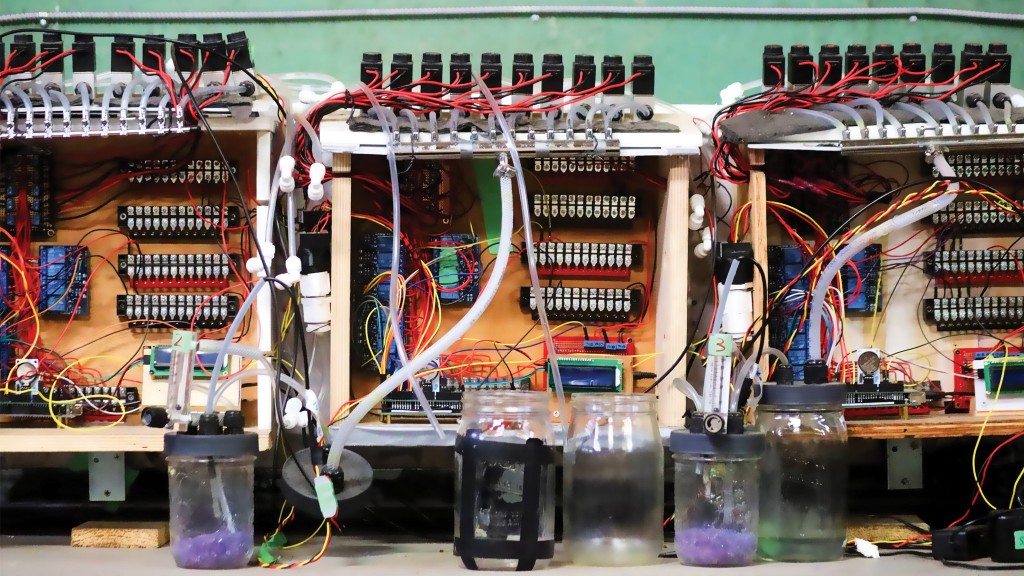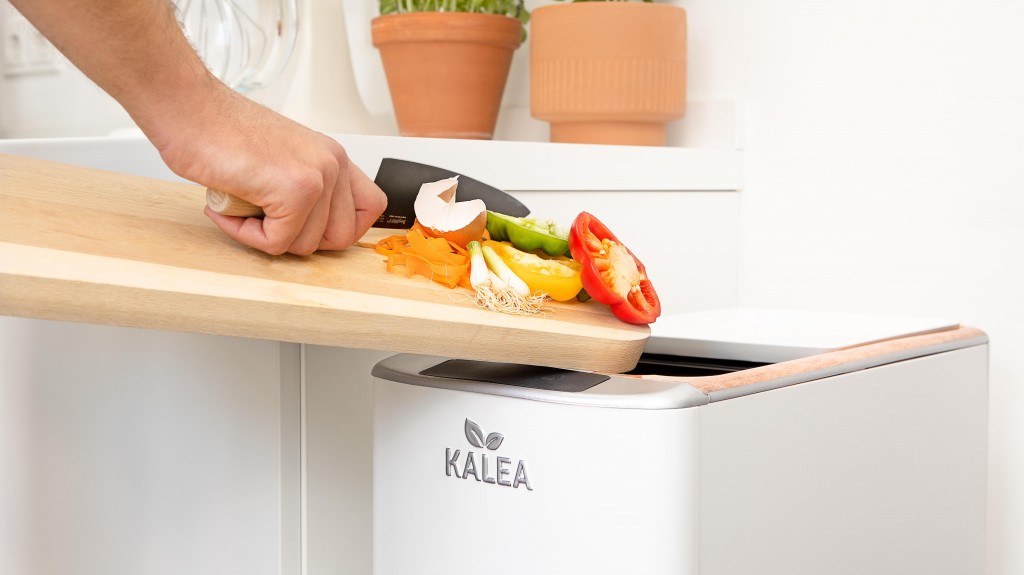
In an ideal world, all waste would be biodegradable. Imagine throwing your plastic cutlery straight into the compost heap after a meal, or even being able to place your shoes directly into the organics bin when they're no longer wearable. While this may seem like a far off vision of the future, companies such as Vancouver-based Regenerative Waste Labs are working towards making this a reality sooner than you might expect.
Regenerative Waste Labs provides begin-at-the-end consulting to guide businesses through the entire product development process to help them understand their products' end of life and ensure that their products stay out of the landfill. As part of this process, the lab conducts biodegradation testing, disintegration testing, and plant ecotoxicity assessments to help businesses understand the role that their product plays in a circular model by analyzing factors such as the speed of degradation and any eco-toxic effects of the product.
Considering themselves experts in regeneration, Regenerative Waste Labs not only studies how things break down, it also emphasizes the significance of creating valuable products from the resulting broken-down materials. By working with waste generators in industrial and agricultural applications, Regenerative Waste Labs provides these businesses with opportunities to turn waste streams into co-product streams that increase revenue and give a second life to waste that would have otherwise been disposed of.
An alternative approach
Founded in 2020, Regenerative Waste Labs began as a collaboration between Recycling Alternative, a local sustainable waste management company, and Regenerative Waste Labs' co-owner and technical director Dr. Love-Ese Chile, a sustainable plastic researcher. During discussions with stakeholders across a variety of industries, it became clear that there was a fundamental lack of support when it came to creating closed-loop and truly sustainable products.
"I spent five years of my PhD studying the different types of bioplastics and biomaterials that are being developed in research labs. At that point, I was working with Recycling Alternative on a project focused on how we can accelerate the degradation of compostable plastics within some of their onsite composting technology that they've been developing and selling to the market," says Chile. "We were very values-aligned in that we wanted to support the transition to bio-based materials and really emphasize and highlight the importance of having effective waste management for those materials, too. That's when we decided to start Regenerative Waste Labs."
Leveraging Chile's background in green chemistry and sustainable science along with Recycling Alternative's industry expertise and network of waste stakeholders, Chile and Recycling Alternative co-owners Louise Schwarz and Robert Weatherbe entered a collaboration to support businesses looking to make the shift to sustainable and circular products with a focus on utilizing bio-based materials.
Adding value to biomaterial waste
The upcycling of organic waste from biomaterials is a key component of Regenerative Waste Labs' service offerings. By finding ways to add value to this waste through biological processes, Regenerative Waste Labs works to harness waste materials and feed them back into the economic system to ensure the resources and energy that went into making the product are not completely lost in the process.
"There are many different waste streams, some recoverable and some not. Our philosophy is the ‘Earth to Dirt' approach, where we can make functional products from organic waste that can then be recovered into compost or other high-value materials. Our research focuses on both biomaterial degradation and upcycling of organic waste. Both sides of the waste management/resource recovery coin."
By applying a recycling business model to organics waste collection, Regenerative Waste Labs creates higher-value end products from organic waste that can then be re-fed into the economic cycle rather than just turning the waste into a soil amendment.
"A lot of the compost operators out there are feeling a lot of unease with regards to compostable products because they don't see the value that those products add to their pile. They see the development of these new materials as causing more problems than they're supposedly solving," says Chile. "The work that we do at the Waste Lab tries to address those pain points for processors with regards to the pre-treatment of organic waste, as well as creating case studies or proof-of-concept tests and experiments to show that you can create a higher value thing. We encourage people who have organic waste to think about incorporating an additional business model that could add value and revenue to their company. We frame it in a way where rather than having to subtract from your revenue stream to manage the waste, you can add to your revenue stream by creating a new product to sell into the marketplace."
Product testing
As part of its low- to zero-waste research and testing lab, the team at Regenerative Waste Labs develops all of their own composting and soil degradation equipment and technologies, from traditional compost tumblers to accelerated in-vessel composters. Using this equipment, Regenerative Waste Labs provides scientific testing that helps businesses assess the bio-degradation behaviours and eco-toxic effects of their products. Following these tests, Regenerative Waste Labs then outlines end-of-life management options to help companies ensure their products stay out of the landfill.
"We recently worked on a plant-based shoe, and the company was wanting to see which of the different components break down and which ones might encounter potential challenges with degradation," says Chile. "So, we provided them with recommendations and information. We're really just trying to be the research support for those companies, giving them the information that they need. If they want to go back to their internal research and development team to design a different formulation for different parts of the product, then that's what we hope to be able to support them in."
Designing with end of life in mind
In addition to testing existing products, Regenerative Waste Labs offers begin-at-the-end consulting which helps businesses understand the importance of thinking about a product's end of life during the design phase. By working with company executives, marketing, sales, and technical departments, Regenerative Waste Labs handles everything from developing product sustainability guidelines to sourcing and selecting sustainable materials for their clients' products.
"We work with people within their development process, so we can run different samples and tell them which ones have the best biodegradation behaviour so that they can better tailor their formulation to ensure that products are meeting their required properties for use, as well as the requirements for end of life," says Chile. "We also work with people who have already gone through the development phase and they're wanting to get guidance with certifications. We can help them navigate how to get the appropriate testing done, who to talk to within the different organizations, and then help them set it all up. If they need field testing or other types of testing, we also connect them with the right players in that space."
Since certification can be a complex and confusing process, the Waste Labs team acts as liaisons when working with certification agencies to ensure the proper documentation and tracking of the certification process, as well as assisting businesses when it comes to navigating complicated regulatory environments and obtaining different compostability certifications. They have also created an online learning portal to provide businesses with up-to-date information on the evolving sustainable materials landscape.
"We do not certify products, but we help teams within their research and development phase as well as people who have gone through the certification process and want to develop marketing assets to actually show how their product degrades since the certification programs don't necessarily provide that additional information," says Chile. "We always counsel our clients to first go out and get their products certified and then put them through field testing programs to make sure that the products break down at scale when they're actually entering industrial facilities."
By supporting the transition to bio-based materials and helping companies create closed-loop products, Regenerative Waste Labs is making the idea of a truly circular economy more feasible than ever. While this change won't happen instantaneously, shifting the way that we as a society view waste is a vital first step towards reducing our reliance on finite resources.
"It's really about being honest and truthful about how our waste systems currently are, and using that information to push everybody to be better," says Chile. "We need to create better products, better systems, and better technologies that can handle those materials, too."



